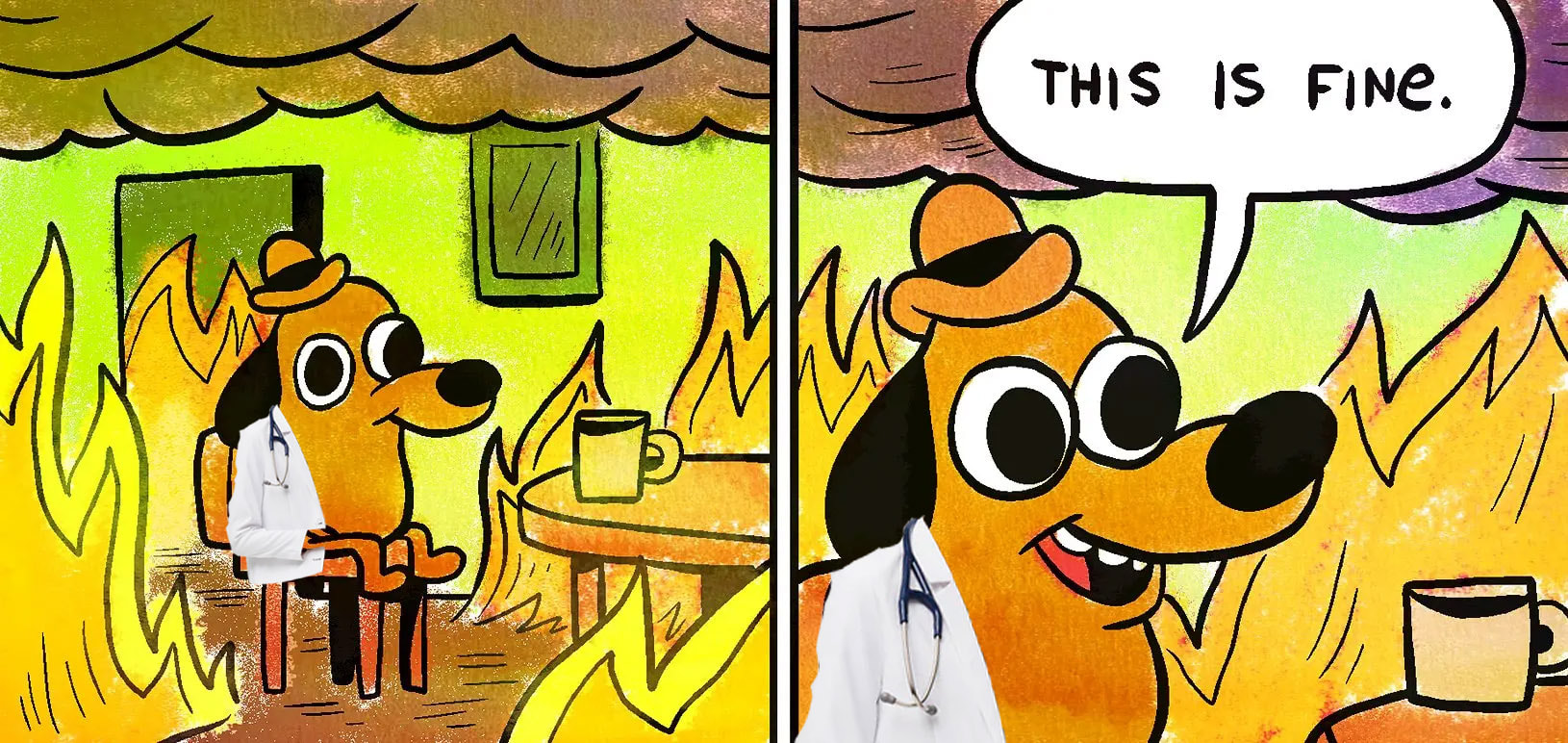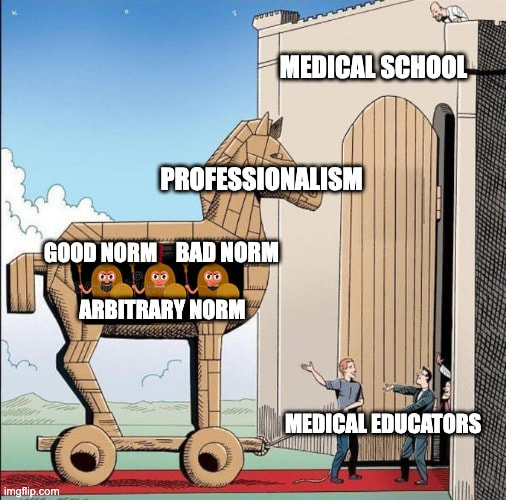|
Medical students are socialized to feel like we don't understand clinical practice well enough to have strong opinions about it. This happens despite the wisdom, thoughtfulness, and good intentions of medical educators; it happens because of basic features of medical education. First, the structure of medical school makes medical students feel younger—and correspondingly less competent, reasonable, and mature—than we are. Two-thirds of medical students take gap years between college and medical school, so many of us go from living in apartments to living in dorms; from working full-time jobs to attending mandatory 8am lectures; from freely scheduling doctors' appointments to being unable to make plans because we haven't received our schedules. I once found myself moving into a new apartment at 11pm because my lease ended that day, but I had been denied permission to leave class early. Professionalism assessments also play a role. "Professionalism" is not well defined, and as a result, "behaving professionally" has more or less come to mean "adhering to the norms of the medical profession," or even just "adhering to the norms the people evaluating you have decided to enforce." These include ethical norms, behavioral norms, etiquette norms, and any other norms you might imagine. For instance, a few months into medical school, my class received this email: "Moving the bedframes violates the lease agreement that you signed upon entering [your dorm]. You may have heard a rumor from more senior students that this is an acceptable practice. Unfortunately, it is not... If you have moved or accepted a bed, and we do not hear from you it will be seen as a professionalism issue and be referred to the appropriate body." (emphasis added) When someone tells you early in your training that something is a professionalism issue, your reaction may be "hm, I don't really see why moving beds is an issue that's relevant to the medical profession, but maybe I'll come to understand." First-year medical students are inclined to be deferential because we recognize how little we know about the medical profession. We do not understand the logic behind, for instance, rounds, patient presentations, and 28-hour shifts. Many of these norms eventually start to make sense. I've gone from wondering why preceptors harped so emphatically on being able to describe a patient in a single sentence to appreciating the efficiency and clarity of a perfect one-liner. But plenty of norms in medicine are just bad. Some practices are manifestations of paternalism (e.g., answering patients' questions in a vague, non-committal way), racism or sexism (e.g., undertreating Black patients' pain), antiquated traditions (e.g., wearing coats that may transmit disease), or the brokenness of the US health care system (e.g., not telling patients the cost of their care). The bad practices are often subtle, and even when they aren't, it can take a long time to realize they aren't justifiable. It took me seeing multiple women faint from pain during gynecologic procedures before I felt confident enough to tentatively suggest that we do things differently. My default stance was "there must be some reason they're doing things this way," and it required an overwhelming amount of evidence to change my mind.
Other professions undoubtedly have a similar problem: new professionals in any field may not feel that they can question established professional norms until they've been around long enough that the norms have become, well, normalized. As a result, it may often be outsiders who push for change. For instance, it was initially parents—not teachers—who lobbied for the abolition of corporal punishment in schools. Similarly, advocacy groups have created helplines to support patients appealing surprise medical bills, even as hospitals have illegally kept prices opaque. The challenge for actors outside of medicine, though, is that medicine is a complicated and technical field, and it is hard to challenge norms that you do not fully understand. Before I was a medical student, I had a doctor who repeatedly "examined" my injured ankle over my shoe. I didn't realize until my first year of medical school that you can't reliably examine an ankle this way. In some ways, medical students are uniquely well-positioned to form opinions about which practices are good and bad. This is because we are both insiders and outsiders. We have some understanding of how medicine works, but haven't yet internalized all of its norms. We're expected to learn, so can ask "Why is this done that way?" and evaluate the rationale. And we rotate through different specialties, so can compare across them, assessing which practices are pervasive and which are specific to a given context. Our insider/outsider status could be both a weakness and a strength: we may not know medicine, but our time spent working outside of medicine has left us with other knowledge; we may not understand clinical practice yet, but we haven't been numbed to it, either. One of the hardest things medical students have to do is remain open and humble enough to recognize that many practices will one day make sense, while remaining clear-eyed and critical about those that won't. But the concept of professionalism blurs our vision. It gives us a strong incentive not to form our own opinions because we are being graded on how well we emulate norms. Assuming there are good reasons for these norms resolves cognitive dissonance, while asking hard questions about them risks calling other doctors' professionalism into question. Thus, professionalism makes us less likely to trust our opinions about the behaviors we witness in the following way. First, professionalism is defined so broadly that norms only weakly tied to medicine fall under its purview. Second, we know we do not understand the rationales underlying many professional norms, so are inclined to defer to more senior clinicians about them. In combination, we are set up to place little stock in the opinions we form about the things we observe in clinical settings, including those we're well-positioned to form opinions about. In the absence of criticism and pushback, entrenched norms are liable to remain entrenched.
0 Comments
|
Archives
December 2023
Categories
All
Posts
All
|


 RSS Feed
RSS Feed